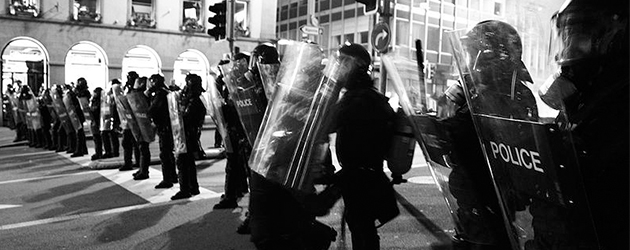2010-02-08
Chinese authorities anticipate more Uyghur unrest over the year’s biggest holiday.

AFP
Chinese armed police take position on Sept. 12 outside the court building in Urumqi where six Uyghur defendants were sentenced in October.
HONG KONG—Chinese authorities in the troubled northwestern region of Xinjiang are scaling up security measures, recruiting new personnel and increasing checks and searches ahead of the Lunar New Year festivities next week.
The mayor of the regional capital of Urumqi, where deadly ethnic riots killed nearly 200 people in July, announced a continuing security crackdown on supporters of independence for the Xinjiang Uyghur Autonomous Region and its population of Muslim Uyghurs.
Urumqi mayor Jerla Isamudinhe announced a persistent crackdown on the “three forces” of terrorism, separatism, and extremism on Thursday, saying the city faced an “arduous fight against separatism now and for years to come.”
Isamudinhe told a session of the municipal People’s Congress that all “sabotage activities” should be prevented, by keeping a closer eye on migrants’ communities, ex-convicts, and other “sensitive areas and suspicious people.”
Internet content from the region would also be kept under tight control, he said.
New security personnel sought
His speech came as the Xinjiang authorities began a recruitment drive for 5,000 special police officers in the region to prevent recurrences of the Urumqi riots, in which 197 people were killed and 1,600 injured, by official count.
The new forces are charged with detecting terrorist plots and cutting contacts between domestic and overseas “hostile forces,” official media reported.
Those recruited would be classed as civil servants under the leadership of the Xinjiang Regional Public Security Bureau, with their area of operations covering the whole region, Xinhua news agency said.
More than 3,600 people, mostly former military personnel and university graduates, had joined the new force, which began training its first 2,360 recruits on Tuesday in Urumqi, it said.
Local people said a strong police presence was building up in Urumqi.
“There are a lot more police around now,” said a resident surnamed Wang.
“And there are quite a few more special police too. That’s the regional specialized branch of the People’s Armed Police,” he said.
“They are arranging everything around here now.”
Another resident said each residential district was hiring security personnel at monthly salaries of 1,000 yuan.
“It’s for people to go to work as a private security guard in the residential compounds alongside the police and the special police units, taking care of security and the floating population and so on,” he said.
Some missing
Dilxat Raxit, spokesman for the Munich-based World Uyghur Congress, said the authorities had tightened security ahead of the Lunar New Year holiday period.
“The local government is beginning a new round of ‘Strike Hard’ in the run-up to Spring Festival,” Raxit said.
“This crackdown is being carried out according to guidelines established after the July rioting in Urumqi. What this means is that any Uyghur in the Urumqi city limits can be subjected to being stopped and searched at any time by police or Xinjiang special police,” he said, adding that reports showed some people had gone missing altogether.
He said the depiction of the new security initiative as part of a war on terror was misleading.
“The Chinese government wants to clamp down on freedom of speech, and before they step up their oppressive activities, they want to make up a few lies that correspond with what the government needs, in order to mislead the international community,” Raxit said.
“There is already a large increase in police presence in Urumqi,” he said, calling on the Chinese government to open up a dialogue with exiled Uyghur leaders.
Another Urumqi resident said there was scant cheer for local Han Chinese ahead of the Lunar New Year celebrations.
“There aren’t that many people in the supermarkets this year, getting ready for the Lunar New Year. People here are having a terrible time, and no one is buying firecrackers,” he said.
“The July rioting was linked to the poverty, not the poverty to the July riots,” he said.
“Of course it was the Uyghurs who started it. We all know the reason. There’s no use in saying it.”
Migrants targeted
Urumqi authorities have also announced a plan to clear the city’s growing number of migrant communities, who live in what official media described as “shanty towns” around the city.
According to Xinhua, Urumqi has a total of 48 shantytowns, which sit on prime real estate in the downtown area, with some of the homes decades old.
“The areas have gathered people of different ethnic groups including Han, Uyghur, Hui, Kazak, Mongolian, Russian and others,” the agency said.
ABOUT HUMAN RIGHTS IN EAST TURKISTAN Uyghur Foundation Stichting Oeigoeren Nederland Stichting Uighur Jurat Barat Stichting Uyghur Oost-Turkestan Uyghur Logo Nederlanders Holland Europe HUMAN RIGHTS Xinjiang Uyghur Autonomous Region

Leave a Reply